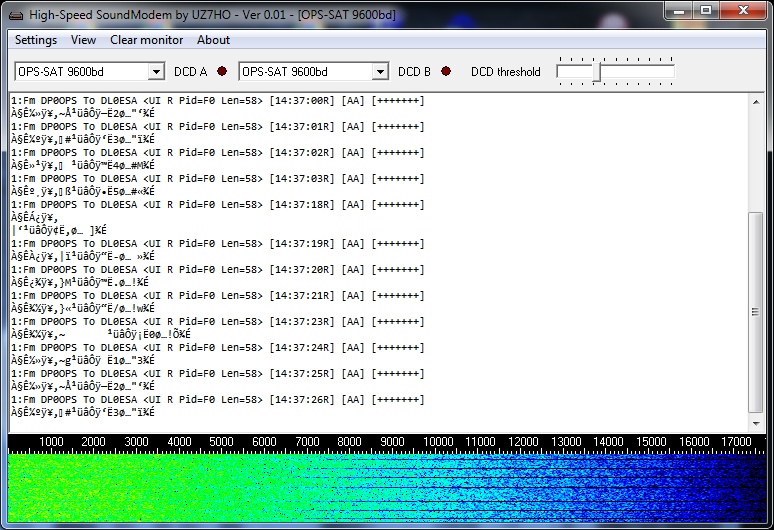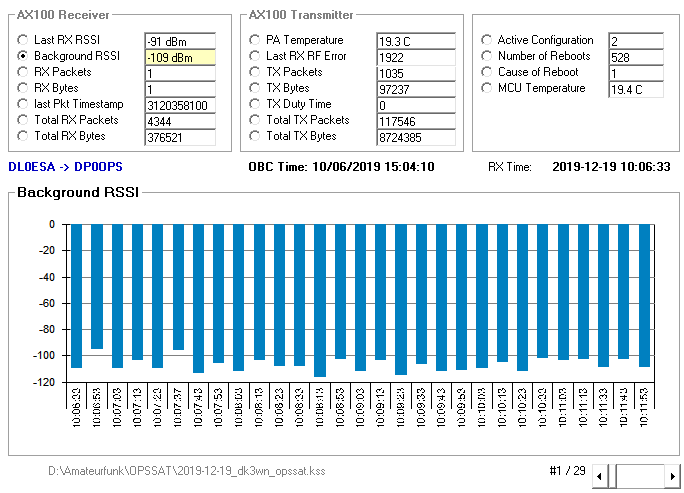Dear Experimenter Community,
We are happy to share with you the success of ESA's seed funding initiative on OSIP (Open Space Innovation Platform):
All 12 experiment proposals chosen for funding were successfully deployed on OPS-SAT-1 and mastered the in-orbit conditions.
Read here all about the objective of the campaign, the encountered challenges and the impressive results.
More detailed information about the individual experiments including a technique to improve the resolution of satellite images, new data compression algorithms and a new communications protocol can be found on OSIP or here.
Best regards,
The OPS-SAT Mission Control Team
Dear Experimenter Community,
The ARTES Scylight OPS-SAT-2 call is out, looking for proposals for an OPS-SAT-2 mission dedicated to optical and quantum communications.
This is a great opportunity for European and Canadian industry to rapidly launch missions which explore the challenges and opportunities arising from optical satellite communication. A revolution is coming and the first to manage to master this technology under operational conditions will gain a massive advantage. Let's not get left behind!
Dear Experimenter Community,
The OPS-SAT Space Lab call for Space Cybersecurity Services, a co-operation with the ESA directorate of Telecommunication and Integrated Applications, is now open: until the 12 of April any company or organization of an ESA country can apply to test, validate and showcase their space cybersecurity products on OPS-SAT 1 .
To counteract and decrease the risk of damage of Cyberattacks in space, ESA aims to support and accelerate Space Cybersecurity Service development. With this call, it provides industry with an environment for testing demonstrations and conducting proof of concept studies in space.
We are excited about the co-operation and possible results, which may later on be presented at the Software Defined Space Conference (November 2023 in Tallinn, Estonia).
Best wishes,
The OPS-SAT Mission Control Team
Dear OPS-SAT Experimenter Community,
We wanted to share with you the exciting news of winning the International SpaceOps 2023 Award for Outstanding Achievement.
All of us are very grateful to have had the opportunity to contribute to the OPS-SAT mission and its revolutionary approach to space operations. In cooperation with experimenters, we found creative and innovative solutions to new challenges, and in the end several successfully tested concepts are now being adopted by big upcoming missions.
A big thank you to all our experimenters that have made this remarkable success possible!
We are looking forward to continuing this adventure together,
Best wishes,
The OPS-SAT Mission Control Team
Dear OPS-SAT Experimenter community,
We are happy to announce that up to this date we count already over 200 experiments registered with us. In addition to publications on the spacecraft itself, more and more papers are being released featuring experiment results gained by OPS-SAT, and by now the mission has been subject to numerous international conferences and featured in prestigious journals.
With the 3 year anniversary of OPS-SAT in orbit coming up, we have put together a list of publications, visualizing the scientific impact of the mission, which you can find [[here|https://opssat1.esoc.esa.int/projects/publications]] [1].
Thank you for the successful cooperation, we are looking forward to further experiments,
Best wishes,
The OPS-SAT Team
[1] https://opssat1.esoc.esa.int/projects/publications
Dear OPS-SAT Experimenter community,
We are glad to announce that a new campaign [1] dedicated to exploring and supporting new experiment ideas on OPS-SAT was just launched on the OSIP platform!
Experiment proposals can be submitted until May 23rd and selected ideas will receive funding for the development and deployment of the experiment.
OSIP has reversed the classic approach of engaging with ESA. Whereas the Agency typically invites industry and academia to apply to work on specific research or technology developments, OSIP seeks ideas from the wider community and then ESA helps find the most appropriate mechanism to support the implementation of the most novel ideas.
Update: Existing OPS-SAT experimenters are also encouraged to apply. The only logical restriction is that if your experiment was already executed 1 or more times on-board the spacecraft, then the proposal submitted to the OSIP platform should be an evolution.
Kind regards,
OPS-SAT FCT
[1] https://ideas.esa.int/servlet/hype/IMT?documentTableId=45087640620583691&userAction=Browse&templateName=&documentId=44b778b1fd71bbce5e75cee6bde9da8b
Dear OPS-SAT Experiment Community,
I am writing with the great news that the first non-ESA experiments have been executed on OPS-SAT and the results are impressive. ESA released the following web article today. There are lots of links in that page to the experimenter's own press releases, the photo archive on Flickr etc.
https://www.esa.int/Enabling_Support/Operations/Interplanetary_internet_cameras_in_space_ESA_s_OPS-SAT_first_results
It will not be the last as we have quite a few experiments in the pipeline.
I would also like to draw your attention to the experimenter portal https://opssat1.esoc.esa.int/ - which Georges Labrèche has updated with some latest news and presentations. There is some good information there - including a video of a live pass the team made at the Open Source Cubesat Workshop in December and demos.
Finally I would like to remind you that experiments are entirely free up until Nov 2021. After that point ESOC cannot continue to operate the mission for free and so we will be asking the Member States to contribute. If we do not cover the cost somehow then the mission will be terminated. We will not charge the experimenters of course but if any of you know your ESA delegate (please find out who they are, as I cannot tell you) then please let them know what you are doing on this platform and that you would like it to continue after Nov 2021. It would be such a shame to turn off the mission when we still have not fully realised its potential! To help communicate this, I attach a simple concept presentation that you can distribute. It is also on the experimenter portal.
All the remains is for me to wish you all a merry Christmas and thank you for keeping faith with us during those difficult days in the commissioning. With your help, 2021 will the year of OPS-SAT-1 - and maybe the start of OPS-SAT-2!
Best regards,
Dave Evans
Good news for Windows users! DK3WN has developed a beacon decoder for OPS-SAT that can be used in conjunction with the popular UZ7HO soundmodem.
Demodulated FM audio from any SDR receiver software is piped to UZ7HO and a TCP/IP KISS interface to the DK3WN Beacon decoder allows for the parsing of the OPS-SAT beacon frames.
DK3WN has also experimented with feeding 48kHz sampled FM demodulated audio to the gr-opssat GnuRadio application and presents the results.
More information at: http://dk3wn.info/blog/satelliten/ops-sat/
UZ7HO Soundmodem decoding OPS-SAT:

DK3WN Beacon Decoder:

(images by DK3WN)



